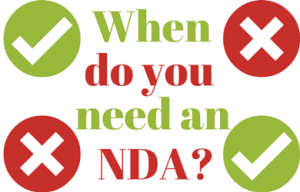 “NDA” stands for Non-Disclosure Agreement. (“NDA”) These agreements are also sometimes called Confidentiality Agreements, and they might even be one provision within an agreement that covers a the entire understanding between parties.[1] Whatever they are called or found, these agreements are basically contracts designed to define the consequences that you could impose if someone shared your secret information. You may be asked to sign an “NDA” if you are receiving confidential information and you do not already have a legal duty to preserve the confidentiality of the information. Sometimes people use generic NDA’s without fully understanding the meaning of these agreements with disastrous results.
“NDA” stands for Non-Disclosure Agreement. (“NDA”) These agreements are also sometimes called Confidentiality Agreements, and they might even be one provision within an agreement that covers a the entire understanding between parties.[1] Whatever they are called or found, these agreements are basically contracts designed to define the consequences that you could impose if someone shared your secret information. You may be asked to sign an “NDA” if you are receiving confidential information and you do not already have a legal duty to preserve the confidentiality of the information. Sometimes people use generic NDA’s without fully understanding the meaning of these agreements with disastrous results.
What is disaster for a provider of confidential information?
When you think of what you want in a contract, it helps to start with the worst case scenario outcome. One worst case would be sharing a secret with a wealthy recipient, who takes your information and uses its resources to exploit the information without you. In that instance, your goal would be to extract the value that the recipient got out of the secret you shared. You could structure your NDA so if this worst case happened, you could sue, have the recipient pay your legal bills, stop them from using the information, even give you back any proceeds from their using the information or a specific amount or percentage. If you used a generic NDA, the disaster would be insufficient definition of the damages you would suffer from having someone exploit your secret. A big powerful company that could use your information could also bury you in a lawsuit because they would have more money to spend on the matter than you. If you have a good NDA, you could be protected from being exploited this way and have a fighting chance in court.
Another worst case is sharing a secret with a recipient who makes the information public, and then others learn your secret and use it for their own advantage. You do not have any recourse against the third parties who learned your information without doing anything wrong, but you can structure an NDA so that you can sue the disclosing party, have them pay for your legal defense, and a pre-defined amount of money that would compensate you for losing the confidentiality of the information. You might even insist that the recipient of your information obtain an insurance policy to cover your loss of the information before disclosing.[2] If you use a generic NDA, you might not be able to do anything about the disclosure because the value of publication of a secret is hard to define and collect.
What is a disaster for the recipient?
A recipient of confidential information also needs protection. Recipients’ worst case scenario would be to receive information that they already know, and then to be accused of capitalizing on information they obtained from a disclosing party. They want to know that the definition of confidential is very clear. For example, you might want to define the information as written documents, disclosed during the month of November 2014, by the disclosing party to the recipient, marked confidential in red letters. You might want to exclude information that is already public knowledge or otherwise already known from the “confidential” definition. Another worst case scenario for a recipient might be keeping the confidential information in their file cabinet, and then a burglar breaks into the facility and steals the file. The contract should be specific about defining a reasonable duty to preserve the confidentiality of the information, such as stating that the manner that the recipient keeps its own confidential information, (such as in its server, in its locked file cabinet, or otherwise) is sufficient to fulfill the duty of confidentiality. The recipient might also want to have an expiration for the length of time that the information must remain confidential. A year or ten years might be a reasonable time.
The next time you think you might be handed a “Mutual NDA” in a meeting, come prepared with your own NDA, specifically tailored to your situation. If you are prepared for the worst-case scenario, you might be able to avoid disaster by having an NDA that really protects you and your information.
Other articles:



